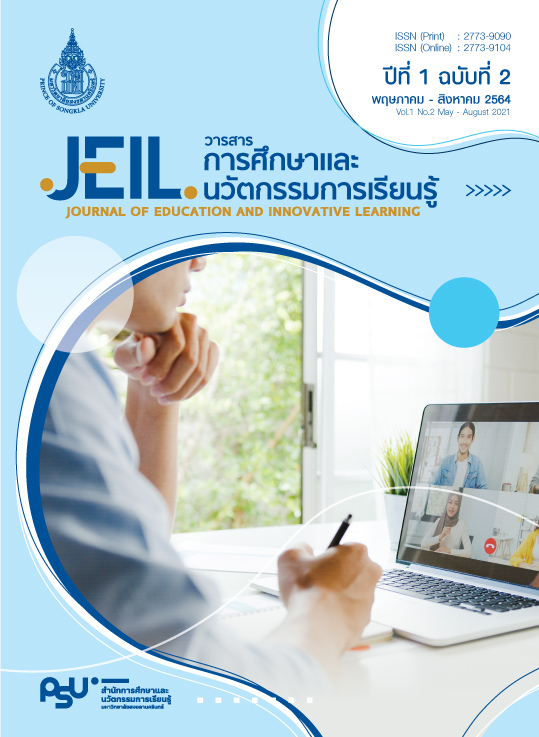ผลของการจัดการเรียนรู้แบบใช้โครงงานเป็นฐาน เรื่องการเคลื่อนที่ เพื่อพัฒนาทักษะกระบวนการทางวิทยาศาสตร์ขั้นบูรณาการ และความสามารถในการแก้ปัญหาทางวิทยาศาสตร์ของนักเรียน ชั้นประกาศนียบัตรวิชาชีพปีที่ 2
Main Article Content
บทคัดย่อ
การวิจัยครั้งนี้มีวัตถุประสงค์ (1) เพื่อพัฒนากิจกรรมการเรียนรู้แบบโครงงานเป็นฐาน เรื่องการเคลื่อนที่สำหรับนักเรียนระดับชั้นประกาศนียบัตรวิชาชีพปีที่ 2 (2) เพื่อเปรียบเทียบทักษะกระบวนการทางวิทยาศาสตร์ขั้นบูรณาการของนักเรียน ก่อนและหลังเรียนด้วยการจัดการเรียนรู้แบบโครงงานเป็นฐานและ (3) เพื่อเปรียบเทียบความสามารถในการแก้ปัญหาทางวิทยาศาสตร์ของนักเรียน ก่อนและหลังเรียนด้วยการจัดการเรียนรู้แบบโครงงานเป็นฐาน
กลุ่มที่ศึกษาคือ นักเรียนระดับชั้นประกาศนียบัตรวิชาชีพปีที่ 2 วิทยาลัยเทคโนโลยีอีสานเหนือ 2 กุมภวาปี จำนวน 20 คน ได้มาโดยสุ่มแบบยกกลุ่ม เครื่องมือที่ใช้ ได้แก่ (1) แผนการจัดการเรียนรู้โดยใช้โครงงานเป็นฐาน จำนวน 4 แผน (2) แบบทดสอบวัดทักษะกระบวนการทางวิทยาศาสตร์ขั้นบูรณาการ ชนิดเลือกตอบ 4 ตัวเลือก จำนวน 20 ข้อ และ (3) แบบทดสอบวัดความสามารถในการแก้ปัญหาทางวิทยาศาสตร์ แบบอัตนัย จำนวน 20 ข้อ สถิติที่ใช้วิเคราะห์ข้อมูล คือ ค่าร้อยละ ค่าเฉลี่ย ส่วนเบี่ยงเบนมาตรฐาน และทดสอบที (กลุ่มไม่อิสระ)
ผลการวิจัยพบว่า (1) กิจกรรมการเรียนรู้แบบโครงงานเป็นฐานเรื่องการเคลื่อนที่มี 4 แผนมีความเหมาะสมในระดับมากที่สุด (=4.60), (2) ทักษะกระบวนการทางวิทยาศาสตร์ขั้นบูรณาการหลังเรียน (
=17.30) สูงกว่าก่อนเรียน (
=11.25), และ (3) ความสามารถในการแก้ปัญหาทางวิทยาศาสตร์หลังเรียน (
=36.55) สูงกว่าก่อนเรียน (
=26.70) อย่างมีนัยสำคัญทางสถิติที่ระดับ .01
Article Details

อนุญาตภายใต้เงื่อนไข Creative Commons Attribution-NonCommercial-NoDerivatives 4.0 International License.
เนื้อหาและข้อมูลในบทความที่ตีพิมพ์ในวารสารการศึกษาและนวัตกรรมการเรียนรู้ ถือเป็นข้อคิดเห็นและความรับผิดชอบของผู้เขียน ซึ่งกองบรรณาธิการวารสาร ไม่จำเป็นต้องเห็นด้วยหรือร่วมรับผิดชอบใด ๆ และไม่สงวนสิทธิ์การคัดลอกบทความเพื่อใช้ประโยชน์ทางวิชาการ แต่ให้อ้างอิงข้อมูลแสดงที่มาของบทความทุกครั้งที่นำไปใช้ประโยชน์
เอกสารอ้างอิง
Academic Group E-Sarn Technological College 2 Kumphawapi. (2019). Quality assurance report (15th ed.). Udonthani: Author. [in Thai]
American Association for the Advancement of Science. (1970). Science a process approach commentary for teacher. Washington D.C.: Author.
Angthong, W. (2020). Development of intergrated science process skill of mathayomsuksa 5 students learned by project-based STEM education. RMU. J, 14(1), 91-103 [in Thai]
Boonsri, P. (2018). The development of project-based learning process to enhance critical thinking and problem solving of prathomsuksa 6 students at ban pong school under Chiang Rai primary educational service area office 1. Office of the basic education commission. [in Thai]
Charoenrat, J., & Nillapun, M. (2014). The development of analytical thinking ability and science process skills for ninth grad students taught by project approach. Journal Silpakorn Education Research, 6(2), 182-194. [in Thai]
Chatraphorn, P., Suwonjandee, N., & Asavapibhop, B. (2008). Time changed... you physics score changed... who did this (Physics learning results of the first year university level during changing the entrance examination system). Thai Journal of Physics, 25(3), 19-24. [in Thai]
Denduang, S., & Uamcharoen, S. (2013). The development of learning outcomes on analytical listening and viewing of the eighth grade students taught by project-based learning approach. Journal Silpakorn Education Research, 5(1), 84-96. [in Thai]
English, M. C., & Kitsantas, A. (2013). Supporting student self-regulated learning in problem and project-based learning. The Interdisciplinary Journal of Problem-Based Learning, 7(2), 128-150. doi:10.7771/1541-5015.1339
Junping, J., Patarathitinant, S., & Achiwawanich, S. (2012). The development of and integrated science process skills of grade 8th students using the inquiry method. The 2nd STOU graduate research conference. Sukhothai Thammathirat University, Thailand. [in Thai]
Kubiatko, M., & Vaculová, I. (2011). Project-based learning: characteristic and the experiences with application in the science subjects. Energy education science and technology part B: social and educational studies. 3(1), 65-74.
Office of the Education Council, Ministry of Education. (2011) Proposals for the second decade of education reform (2009-2018). (2nd ed.). Bangkok: Prigwan Graphic. [in Thai]
Panich, V. (2015). Ways to create learning for students in the 21st century. Walailak Journal of Learning Innovations, 1(2), 3-14. [in Thai]
Penphaiboon, A. (2016). The development of physic learning for mattayom wat nongjok school’s student in atthayomsuksa 4 by using project-based learning (Master’ thesis). Dhurakij Pundit University. [in Thai]
Phornphisutthimas, S. (2008). Teaching sciences using science process skills. Advanced Science Journal, 8(2), 28-38. [in Thai]
__________. (2013). Learning management of science in 21st century. J. Res. Unit Sci. Technol. Environ. Learning, 4(1), 55-63. [in Thai]
Pongaen, W., Pratumsuwan, P., & Hutaman, S. (n.d.). Project-based teaching and learning. Retrieved from http://www.fte.kmutnb.ac.th/km/project-based%20learning.pdf. [in Thai]
Prampreeda, A. (2015). The effect of using games and 5Es learning cycle model for teaching science in multicultural society toward achievement, science process skills and multicultural attitudes in the human body system of 8th grade students (Master’ thesis). Songkla, Thailand: Prince of Songkla University [in Thai]
Sanguanhong, N. (2009). The Development of a science process skills test for mathayom suksa 3 students in trat educational service area (Master’ thesis). Bangkok, Thailand: Sukhothai Thammathirat University. [in Thai]
Saksuparb, K. (2021). The development of an active learning model on physics by using problem-based to enhance problem solving skills and learning achievement of matthayomsuksa in students. Journal of Education Burapha University, 32(1), 46-60. [in Thai]
Seangpiroh, J. (2011). Development of science process skills and learning achievement of natural polymers using science project based learning for grade 12 students (Master’ thesis). Ubon Ratchathani, Thailand: Ubon Ratchathani University. [in Thai]
The Institute for the Promotion of Teaching Science and Technology. (2016). Annual report 2015 (2nd ed.). Bangkok: Success Publishing. [in Thai]
Thongaime, A. (2018). Project-based learning for developing student in the 21st century. Journal of humanities and social sciences Valaya Alongkorn, 8(3), 185-199. [in Thai]
Tragoolsrid, V. (2008). A proposed model of web-based instruction with project based learning for team learning of students at King Mongkut’s University of Technology Thonburi (Doctoral dissertation). Chulalongkorn University. [in Thai]
Treengoen, W. (2010). The development in scientific problem solving ability by science project. Suthiparithat Journal, 23(72), 69-78. [in Thai]


